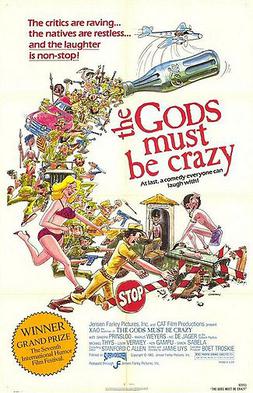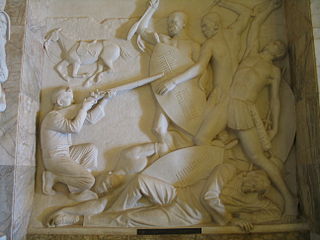
Plane Crazy is a 1928 American animated short film directed by Walt Disney and Ub Iwerks. The cartoon, released by the Walt Disney Studios, was the first appearance of Mickey Mouse and his girlfriend Minnie Mouse, and was originally a silent film. It was given a test screening to a theater audience on May 15, 1928, and an executive from Metro-Goldwyn-Mayer saw the film, but failed to pick up a distributor. Later that year, Disney released Mickey's first sound cartoon, Steamboat Willie, which was an enormous success; Plane Crazy was officially released as a sound cartoon on March 17, 1929. It was the fourth Mickey film to be given a wide release after Steamboat Willie, The Gallopin' Gaucho and The Barn Dance (1929).

The Gods Must Be Crazy is a 1980 comedy film written, produced, edited and directed by Jamie Uys. An international co-production of South Africa and Botswana, it is the first film in The Gods Must Be Crazy series. Set in Southern Africa, the film stars Namibian San farmer Nǃxau ǂToma as Xi, a hunter-gatherer of the Kalahari Desert whose tribe discovers a glass Coca-Cola bottle dropped from an aeroplane, and believe it to be a gift from their gods. When Xi sets out to return the bottle to the gods, his journey becomes intertwined with that of a biologist, a newly hired village school teacher, and a band of guerrilla terrorists.

Nǃxau ǂToma was a Namibian bush farmer and actor who starred in the 1980 film The Gods Must Be Crazy and its sequels, in which he played the Kalahari Bushman Xixo. The Namibian called him "Namibia's most famous actor".

The San peoples, or Bushmen, are the members of any of the indigenous hunter-gatherer cultures of southern Africa, and the oldest surviving cultures of the region. Their recent ancestral territories span Botswana, Namibia, Angola, Zambia, Zimbabwe, Lesotho, and South Africa.

EuroTrip is a 2004 American teen sex comedy film directed by Jeff Schaffer and written by Alec Berg, David Mandel, and Schaffer. It stars Scott Mechlowicz, Jacob Pitts, Michelle Trachtenberg, Travis Wester, and Jessica Boehrs. Mechlowicz portrays Scott "Scotty" Thomas, an American high school graduate who travels across Europe in search of his German pen pal, Mieke (Boehrs). Accompanied by his friend Cooper (Pitts) and twin siblings Jenny and Jamie, Scott's quest takes him to England, France, the Netherlands, Slovakia, Germany, and Italy, encountering awkward, humorous, and embarrassing situations along the way.

Jacobus Johannes Uys, better known as Jamie Uys, was a South African film director, best known for directing the 1980 comedy film The Gods Must Be Crazy and its 1989 sequel The Gods Must Be Crazy II. Uys also directed the 1974 documentary film Animals Are Beautiful People.
Mattheus Uys Krige was a South African writer of novels, short stories, poems and plays in Afrikaans and English. In Afrikaans literature, Krige is counted among the Dertigers. Uys Krige was, according to his friend Jack Cope, very much an exception among Afrikaner poets and writers of his generation due to his hostility to extreme Afrikaner nationalism, White Supremacism, and his literary translations of Latin American poetry by non-White authors into Afrikaans; which have had an enormous influence upon South African literature and culture. Later in his life, Krige served as a mentor and father figure to the Afrikaans literary movement known as die Sestigers; whom he convinced into speaking truth to power about the 1948-1994 rule of the National Party and its policies of both Apartheid and censorship in South Africa.

Planes, Trains and Automobiles is a 1987 American comedy-drama film written, produced, and directed by John Hughes and starring Steve Martin and John Candy, with supporting roles by Laila Robins and Michael McKean. It tells the story of Neal, a high-strung marketing executive, and Del, a good-hearted but irritating salesman, who become travel companions when their flight is diverted, and embark on a three-day odyssey of misadventures trying to reach Chicago in time for Neal's Thanksgiving Day dinner with his family.

The cinema of South Africa refers to the films and film industry of South Africa. Films have been made in English and Afrikaans. Many foreign films have been produced about South Africa, including many involving race relations.

The Gods Must Be Crazy II is a 1989 comedy film written and directed by Jamie Uys, and a sequel to the 1980 film The Gods Must Be Crazy, which Uys also wrote and directed. An international co-production between South Africa, Botswana and the United States, it was produced by the Weintraub Entertainment Group and released by 20th Century Fox on 13 October 1989. In the United States, it was released by Columbia Pictures on 13 April 1990.

Animals Are Beautiful People is a 1974 South African nature documentary written, produced, directed, filmed and edited by Jamie Uys, about the wildlife in Southern Africa, presented with comedic elements. It was filmed in the Namib Desert, the Kalahari Desert and at the Okavango River and Okavango Delta. It was the recipient of the 1974 Golden Globe Award for Best Documentary Film.

Dirk Cornelis "Dirkie" Uys was a Voortrekker hero during the Great Trek.

Petrus Lafras Uys (1797–1838) was a Voortrekker leader during the Great Trek.

A Far Off Place is a 1993 American adventure drama film based on Laurens van der Post's works A Far Off Place (1974) and its predecessor, A Story Like the Wind (1972). It stars Reese Witherspoon, Ethan Randall, Jack Thompson and Maximilian Schell. The plot concerns three young teenagers who must cross the Kalahari Desert to safety when their parents are killed by a poacher.

John Kennedy Marshall was an American anthropologist and acclaimed documentary filmmaker best known for his work in Namibia recording the lives of the Juǀʼhoansi.
The Gods Must Be Crazy is a series of films starring the Namibian San farmer and actor Nǃxau ǂToma.

Papam Pasivadu is a 1972 Indian Telugu-language adventure drama film directed by V. Ramachandra Rao and written by Gollapudi Maruti Rao. A remake of the South African film Lost in the Desert (1969), it stars S. V. Ranga Rao, Nagesh, Master Ramu and Devika. The film revolves around a boy who gets lost in a desert, and his attempts to find his family. Papam Pasivadu released on 29 September 1972 and became a commercial success. The film was remade in Tamil as Pillai Selvam.

Dorothea Frances Bleek was a South African-born German anthropologist and philologist known for her research on the Bushmen of southern Africa.

Gold is a 2022 Australian survival thriller film directed by Anthony Hayes. It stars Zac Efron, Susie Porter, and Anthony Hayes. The film was internationally released on 13 January 2022, before making its debut on streaming service Stan on 26 January 2022.

The Gods Must Be Crazy (soundtrack) is the soundtrack album to the 1980 film of the same name. The original soundtrack erroneously credits all of the music for the film to Johnny Boshoff. Many of the musical contributions appearing in the film were composed by Jack Trombey (a pseudonym for Dutch composer Jan Stoeckart) and feature Fred Mann playing the pan pipes, but were never attributed on the record sleeve. Trombey's compositions were derived from De Wolfe Music's 1977 library music release "The Good Earth".

















